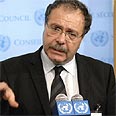
'Hizbullah not fully under control of Lebanese legal authorities.' Mitri
צילום: רויטרס
Lebanon says won’t join talks over kidnapped IDF troops
Culture Minister Mitri says his government disavowed Hizbullah kidnapping operation but chooses not to position itself as broker in negotiations; calls Israel’s retaliation ‘excessive, disproportionate and unjustified’
The Lebanese culture minister said Saturday that his government won’t involve itself directly in negotiations to release the two Israeli soldiers kidnapped by Hizbullah in July.
Tarek Mitri, who represented Lebanon at the United Nations in New York during the conflict, told reporters that his government disavowed the Hizbullah operation, but has chosen not to position itself as a broker in the negotiations.
Speaking at a World Council of Churches meeting in Geneva, Mitri said there had been a “Tradition” of prisoner exchanges between Hizbullah and Israel over the past 20 years, and the government initially expected the two sides to strike a deal in which the soldiers would be swapped for Lebanese detainees held in Israel.
Because of this, the “Excessive, disproportionate, unjustified retaliation” by Israel was unexpected, he said.
Even so, the scope for Beirut to put pressure on Hizbullah was limited, said Mitri, because “Hizbullah is not fully under the control of Lebanese legal authorities.” Asked whether the government would seek to disarm Hizbullah, as Israel has demanded, he said there would “Not be a coercive disarmament” of the group.
Instead, the government would seek to engage Hizbullah in a “Political process.”
'Not an easy battle'
The government realized it needed to integrate Hizbullah forces into the Lebanese army in order to be a sovereign state with a monopoly of arms, said Mitri. But he warned only political means would achieve that end, and the alternative - coercion - would lead the country back into civil war.
During 15 years of inter-ethnic and inter-faith fighting that ended in 1990, an estimated 100,000 Lebanese were killed and almost 1 million displaced. The government also plans to demand compensation from Israel for its bombing of the Lebanon’s civilian infrastructure, which Mitri said had torn the country “To shreds.”
Asking for compensation “is not an easy battle,” he said, “But it is a battle we are going to fight.” “I think asking for compensation is important in itself,” he said.
Mitri said that international organizations had indicated Israel did not comply with international conventions on the conduct of war, and Lebanon would look into taking its case to the International Criminal Court.










